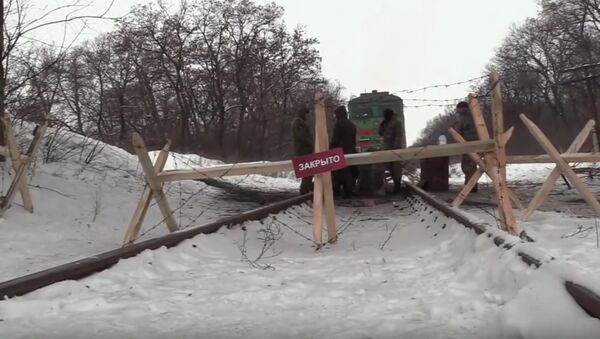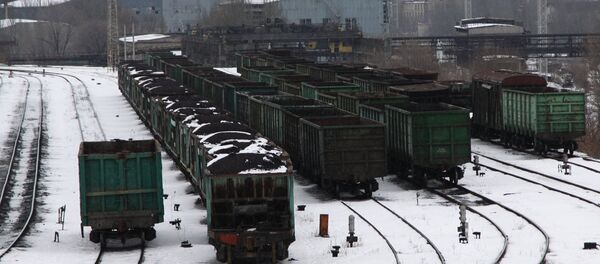KIEV (Sputnik) — Russian Foreign Minister Sergei Lavrov said that a full transport blockade of Donbass contradicts common sense and human conscience.
"This decision contradicts common sense and human conscience," Lavrov said in a comment on the move by Kiev authorities.
Cancellation of Cargo Movement
Earlier on Wednesday, Ukrainian President Petro Poroshenko proposed to the NSDC to completely halt transport connection with the self-proclaimed Donetsk and Lugansk people’s republics until the enterprises in regions return to Ukraine's control.
"The NSDC decided: to temporarily stop the cargo movement along the delimitation line, till paragraphs 1-2 of the Package of Measures for the Implementation of the Minsk Agreements as of February 12, 2015 are implemented, and till the seized enterprises are returned under Ukrainian jurisdiction," NSDC Secretary Oleksandr Turchynov said.
Ukrainian police said that they were ready to implement the NSDC decision.
Sanctions Against Banks
"Moreover, the National Bank of Ukraine, the Security Service of Ukraine were assigned to analyze the activities of Ukrainian banks, which have a capital share of state banks of the Russian Federation, and within a day, make appropriate proposals, in particular, regarding the introduction of sanctions against them," Turchynov said.
There are eight subsidiaries of Russian banks in Ukraine: Ukraine’s branches of Sberbank, VTB and Alfa Bank as well as Ukrsotsbank (subsidiary of Alfa Group), BM Bank (linked to VTB), Prominvestbank (subsidiary of Vnesheconombank) VS Bank (subsidiary of Sberbank) and Forward (part of the Russian Standard group). Alfa Bank, Ukrsotsbank and Forward are likely to be untouched by sanctions as they are not state-owned banks.
Measures on Ukraine's Fuel-Energy and Metallurgic Complex
The NSDC also asked the Ukrainian government to prepare measures aimed at protection the country’s the fuel-energy and metallurgical complex.
"The Cabinet of Ministers of Ukraine was assigned to urgently develop and implement an action plan to ensure safe and reliable operation of the fuel-energy and metallurgical complex of Ukraine, to analyze the negative impact on the economy and the country's budget and to take steps to minimize them," the NSDC statement said.
The step was made following the statement of the DTEK energy company that it lost control over the enterprises located in Donbass.
Reaction to Blockade
The decision was also condemned by the German Foreign Ministry.
"We are concerned about today's decision of the NSDC on temporary halt of cargo movement with separatist regions. This decision, in our opinion, does not lead to deescalation, on the contrary, it deepens the tendency to Donbass separation," German Foreign Ministry spokesman Martin Schaefer said.
He added that the Ukrainian government was not actively opposing the activists, who blocked the cargo traffic.
At the same time the decision was welcomed by organizers of Donbass blockade.
On March 1, the self-proclaimed republics of Donbass decided to impose the receivership regime on Ukrainian enterprises in the area in response to the transport blockade of railway tracks launched by former Ukrainian participants of military operations in Donbass.
Ukraine launched a military operation in Donbass in April 2014, after local residents refused to recognize the new government in Kiev that they viewed as illegitimate. Despite the Minsk peace accords signed in February 2015, the sides continue to blame each other for ceasefire violations.




